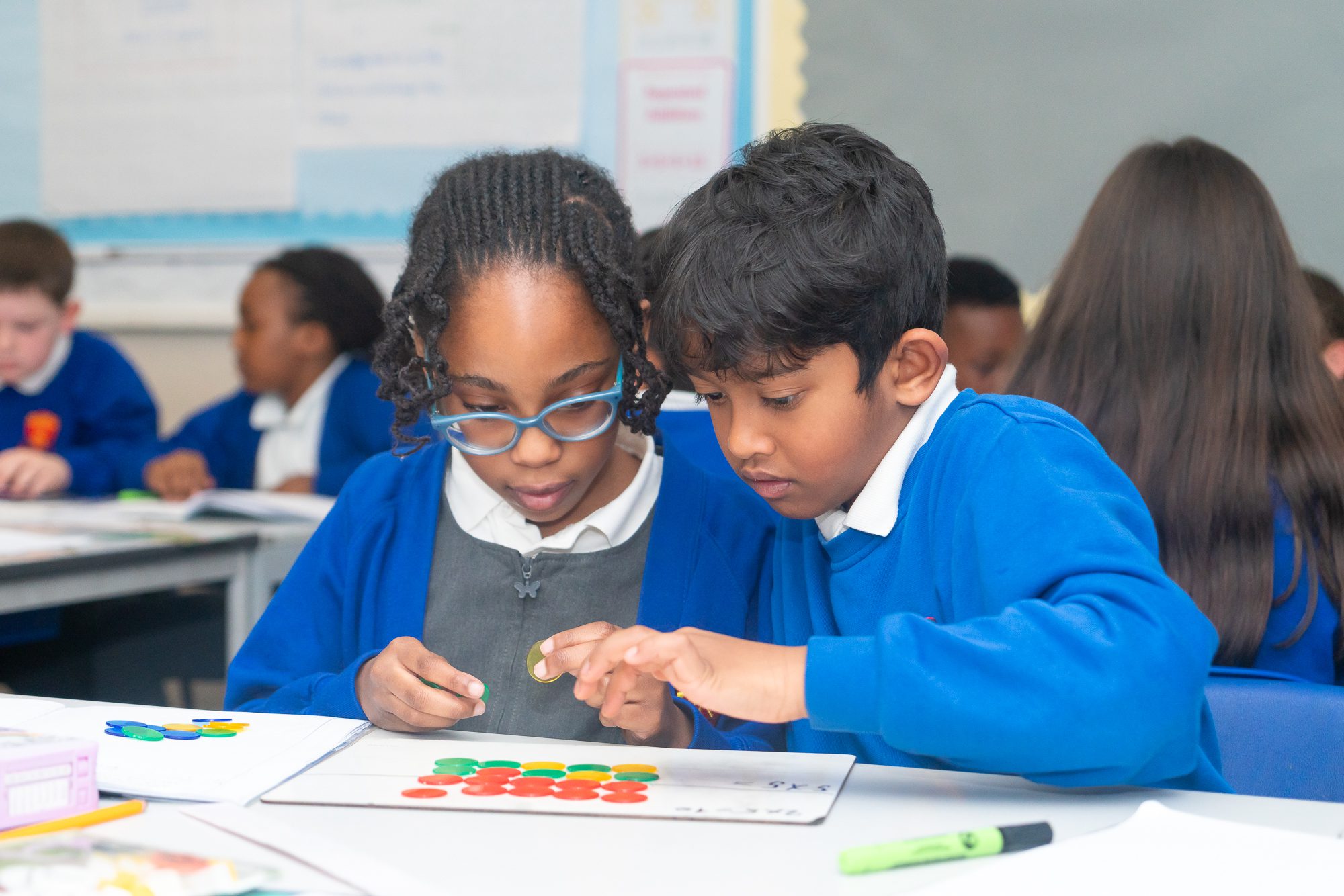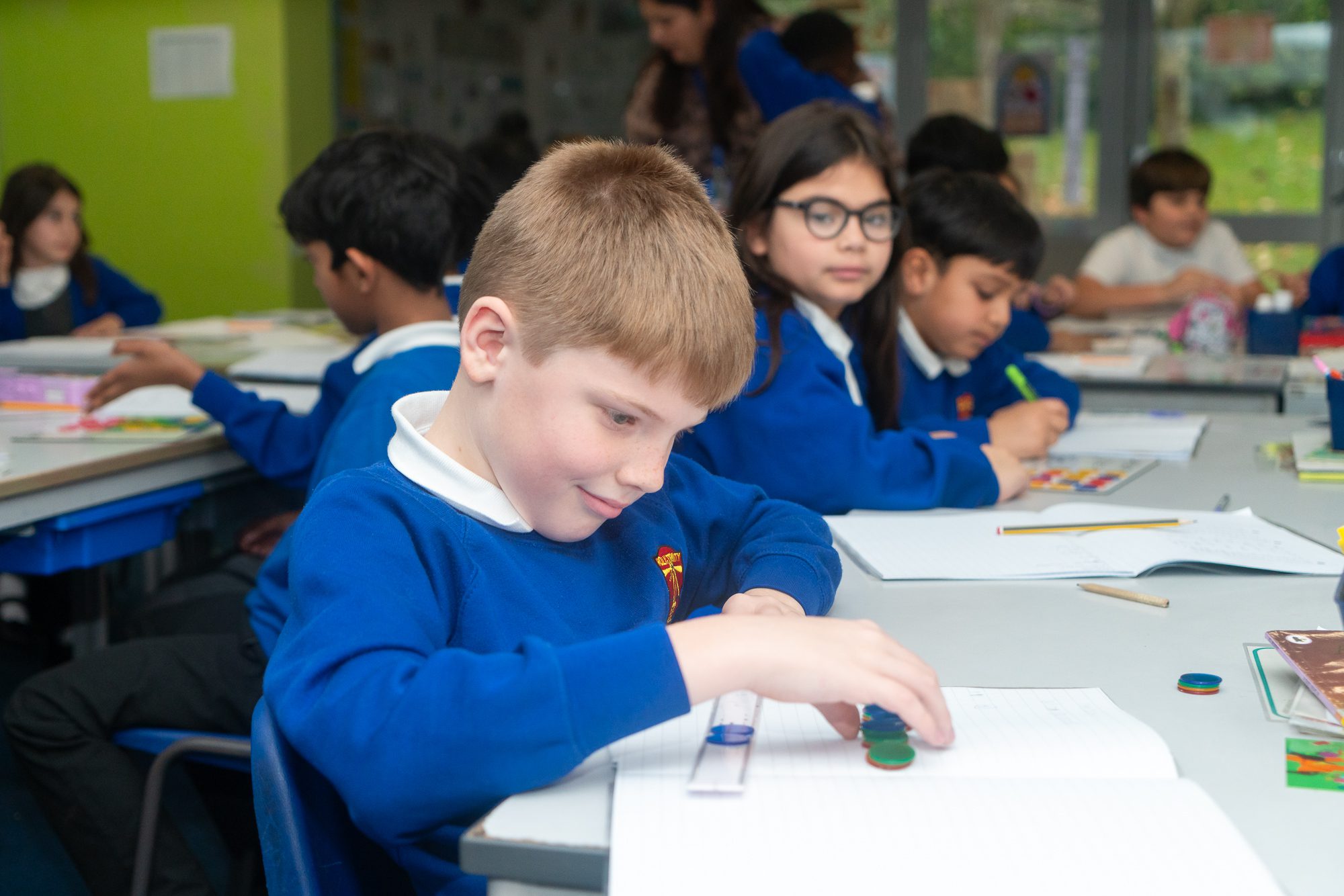Mathematics Subject Leader: Mr J Atkinson
Here at Holy Trinity C of E Primary School, we use White Rose Mathematics, Mastery Number to provide small steps support to all our pupils throughout their Mathematics lessons. Having a high-quality mathematics education is an essential part of everyday life and is crucial to providing a foundation for a child’s future.
Skills and factual fluency are embedded within every Maths lesson and developed consistently over time. We are committed to ensuring that children will be able to recognise the importance of Maths in the wider world and that they are also able to use their mathematical skills and knowledge confidently in their lives in a range of different contexts. We want all children to enjoy Mathematics and to experience success in the subject, with the ability to reason mathematically. We are committed to developing children’s curiosity about the subject, as well as an appreciation of the beauty and power of Mathematics.
For any more information on Holy Trinity’s Mathematics Curriculum, please contact the office.
Here at Holy Trinity, we use White Rose Maths and provide personalised support to all our pupils throughout their Mathematic lessons. Having a high-quality mathematics education is an essential part of everyday life and is crucial to providing a foundation for a child’s future.
Intent
Mathematics teaches us how to make sense of the world around us by developing a child’s ability to calculate, to reason and solve problems.
At Holy Trinity, pupils will be given the opportunity for children to develop practical skills and understanding as outlined in the National Curriculum for Mathematics.
Our pupils will secure their instant recall basic knowledge and calculation skills and have the confidence to reason & solve problems in real-life contexts. They will use mathematical language in order to observe the relationships and patterns.
Through using collaboration and cooperation, pupils will be empowered and encouraged to think creatively and have flexibility when investigating and problem-solving. They will also learn about many people who helped with the development and application of mathematics in our modern world including computing.
This will help prepare our pupils to experience success and enjoyment from mathematics, develop a confident and positive approach to this subject and allow them to flourish and live life in all its fullness.


Implementation
Embedding Quality Teaching and Learning Teachers use a range of assessments for learning strategies in every lesson to allow all children to demonstrate what they can do and to allow increased thinking time when responding to the teacher’s questions. The mathematics subject leader/team
Teachers are embedding the use of concrete materials in lessons throughout the Key Stage to support deep learning. We are investing in a range of high-quality concrete materials across all areas of the mathematics curriculum to support the CONCRETE – PICTORIAL – ABSTRACT approach which is fundamental to teaching for mastery.
Written feedback
We have developed a marking system that clearly identifies areas of success and areas for development. All children have access to a copy of the code which is displayed in the classroom and in their exercise book. Children are expected to respond to the different elements of the code in different ways in response to the teacher’s feedback. Children are given sufficient time to respond to the teacher’s feedback. Supporting teachers to deliver excellence Teachers are developed through a process of co-coaching – monitoring – support – review. Co-coaching sessions were focused on a taught session in the given year group delivered by the Mathematics Lead and observed by the year group team. This was then followed up with a collaborative planning session to unpick the approaches used in the lesson and the impact on learning before applying this to planning future learning.
Regular INSET sessions provide whole-school training and an opportunity to address whole-school issues.
March 2021 focused on the use of concrete materials as during remote learning, the use of these materials had been limited even though, as a school we provided home learning packed with resources to our venerable pupils to embed deep learning and to underpin learning and teach structures before procedures. Learning walks, lesson observations and pupil questionnaires are used as a means to monitor engagement in lessons. Support includes:
- co-coaching sessions with the Mathematics Lead and year group colleagues
- opportunities to plan collaboratively
- training opportunities
The impact of the various support strategies is measured through learning walks, teacher discussions, monitoring, book scrutiny and analysing termly assessment data in Pupil Progress Meetings.
Impact
Better questioning and increased thinking time allow children to articulate their reasoning. Teachers are now getting better at challenging children to explain their reasoning to their peers evidenced in lesson observations and drop-ins. Most importantly, children enjoy their mathematics lessons. Outcomes for pupils in mathematics are reported to Governors.
At Holy Trinity, we’re using the Mastery: Small step approach to the learning and teaching of Mathematics.
White Rose Maths: Teaching maths for mastery is a transformational approach to maths teaching using CPA (Concrete, Pictorial, Abstract) When taught to master maths, children develop their mathematical fluency without resorting to rote learning and are able to solve non-routine maths problems without having to memorise procedures.

Mathematics in Each Stage
Within the EYFS at Holy Trinity Church of England Primary school, adults will support children in developing and expressing their understanding of problem-solving, reasoning and numeracy in a broad range of contexts, through exploration and play. Adults will offer opportunities for these skills to be practised, in order to give children the confidence to use these skills in other areas of learning, as well as during future Mathematical activities.
The Mathematics area of learning includes seeing patterns, making connections, recognising relationships, working with numbers, shapes, space and measures, counting, sorting and matching. Children use their knowledge and skills in these areas to solve problems, generate questions and make connections across other areas of the EYFS. Mathematical understanding will be developed through whole class sessions as well as stories, songs, games and imaginative play.
To achieve this continuous provision are provided which are both practical and highly engaging for our pupils. All concepts are reinforced within daily routines – lining up time, number rhymes, wall calendar, class clock, story time.
In Key Stage 1 at Holy Trinity Church of England Primary School, children are supported in developing their fluency, consolidation and confidence using mastery number (NCETM) and White Rose Maths.
Daily maths lessons provide building blocks towards mastery and efficiency, with opportunities for both guided and independent learning. Children encourage each other to challenge themselves and support each other in their learning by asking and answering questions in whole-class discussions and when working in smaller groups.
We encourage mathematical communication, ensuring that the children are equipped with the language required to explain, justify and prove. We use a variety of good-quality resources in every lesson to support making connections and understanding different mathematical concepts. Pupils further challenge their mathematical thinking through opportunities to investigate and reason.
In Key Stage 2, we continue to use a cumulative curriculum (White Rose Maths) that builds upon learning using small steps, allowing pupils to make deep connections across topics.
Multiple representations are used throughout to strengthen conceptual understanding. Children will continue to have access to a wide range of manipulative (concrete resources) in Key Stage 2 at every stage in order to consolidate a deeper understanding and ensure mastery of the more challenging concepts.
There continues to be an emphasis on deeper learning, and confidently using the correct language to communicate mathematical problems using the Frayer model. We continue to use careful higher-order questioning to encourage students to build mathematical habits of mind.
Using the National Curriculum, we focus on the development of
- Fluency (using known facts to make connections with increasing speed, accuracy and efficiency).
- Problem-Solving (using and applying fluency and logic skills to break down complex problems, understand them and find solutions).
Reasoning (using mathematical language to clearly explain their thinking such as patterns, hypothesise and enquiries).
Mathematics Progression
At Holy Trinity, we develop our pupil’s Mathematics understanding through essential skills; growing their depth of knowledge year after year.
Freckle by Renaissance
In order to provide children with as much support/extra practice of Mathematics and basic knowledge as we can, we have subscribed to an online maths platform called Freckle. Each pupil has been given a login card to access this for home learning. Freckle provides extra maths activities for children which are set at the appropriate level for them to develop their learning. It covers all aspects of maths in an engaging and self-paced way. You can find out more here.

Pupils have three different areas in which they work:
- Adaptative Practice – These activities are linked to their assessments and help to highlight areas of strength and areas for development.
- Fact Practice – These activities involve quick-fire mental maths questions.
- Rucksack – These activities have been set by the Teacher and usually link to direct work in the classroom.
Children can earn coins when they log in and complete activities! These coins can be spent in the shop to buy items for their avatar (character). Time in the shop is limited and activities must be completed first to gain access!
We would like to encourage/allow children to access the site at home, please feel free to support them to log in and help them to navigate the activities. We need children to think for themselves in order to develop their mathematical skills and confidence.
Some acceptable ways to support might include:
- Suggesting a regular time to log in at least once a week for 20 minutes.
- Helping them to log in and troubleshooting technical problems.
- Reading questions out louder to them (it will read questions to them!)
- Asking them to explain to you how they worked their answers out
How-To Login Students
1. Visit: student.freckle.com
(This is where students will log in every time)
2. Enter the class code.
3. Enter the Students Username
(Students’ username is their first and last name)
SEND Information
We ensure that SEND and disadvantaged children are given the necessary support in class to fully access the Maths Curriculum and equal opportunities are given for all to be confident in approaching any problem within the world around them.
Mathematics Extra Resources
Maths is all around us, so at home, you can do a number of simple things to engage pupils in Mathematics, these include:
- Talk to children about the number
- Involve them in shopping e.g. how much would it cost if we bought 2 of these? How much change from a £10 note? This item is half price, what would double the normal price be?
- Measuring ingredients during cooking
- Asking questions about time e.g. ‘If our journey to school takes 25 minutes, should we arrive at school if we leave at 8:05am?’ ‘What is 2 hours after 11am?’ What is 2pm using the 24 hour clock?’
Further Mathematics Help
Fun Mathematics Games

